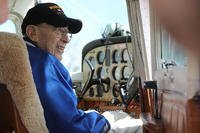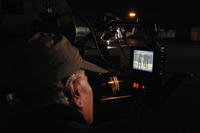
Yesterdays lead news story from Iraq was on the accidental deaths of eighteen children in Ramadi from a bomb blast at a soccer field, which had supposedly been caused by the U.S. military. There was only one problem with the story: it was entirely wrong.
Although thirty-one people were injured in an American detonation of a truck bomb, and subsequently given medical care by U.S. doctors and nurses, nobody was killed in the blast. The destruction -- which had happened near, not on, the soccer field -- had caused a larger explosion than ordnance experts had anticipated, scattering debris in a massive blast wave, according to eyewitness reports from American military personnel.
In a press release, Marine spokesman Capt Paul Duncan demurred, calling the initial reports erroneous. In Baghdad, U.S. Navy Rear Admiral Mark Fox went further. There was no blast [at the soccer field] and there were no eighteen children killed, said Fox at a news briefing. The inaccuracy of the initial reports was covered in detail as a feature story in the Los Angeles Times.
Reporting deliberate falsehood as news is not a rare event in Iraq. The insurgent website albasrah.com features a Daily Resistance Report that chronicles spectacular actions against American military forces, including fabrications of massive casualties inflicted on Americans. And although some frauds are perpetuated because they begin as rumors or conspiracy theories, others suggest careful planning on the part of a media-savvy adversary.
When ON Points Andrew Lubin was in Iraq, he obtained a letter allegedly written and signed by Iraqi Prime Minister Nouri al-Maliki. The letter -- dated January 14, 2007, and marked with the seal of the Republic of Iraq -- was a formal request asking Iranian officials to shelter renegade cleric Muqtada al-Sadr and key leaders in the Mahdi Army. According to the letter, Maliki asked that Sadrs men remain hidden to keep them safe from being arrested or getting killed by American troops. The language implied that Prime Minister Maliki asked for the men to be harbored outside of Baghdad in response to the American and Iraqi troop surge.
The Prime Ministers brazen flaunting of American influence in Iraq in print immediately raised suspicions. When Lubin questioned the Iraqi government and U.S. military sources in Baghdad, they said the letter was a forgery. In a press release, the Iraqi government called the letter, a deliberate distortion, and used signature samples as evidence of fraud. U.S. military officials did not comment publicly, calling the event a domestic matter for the Iraqi government. Privately, a public affairs officer told Lubin that the letter may have originated from a Sunni insurgent group.

After investigating, ON Point came to the same conclusion. An Internet search found that the letter was initially uploaded at an unknown location to the Islamist website m5zn.com on February 2, and almost immediately linked to tajdeed.net, a radical Sunni web organization from the United Kingdom. According to a web hosting database, m5zn.com is registered to a man living in Jeddah, Saudi Arabia.
The use of frauds such as the deaths of innocents, casualty statistics and the letter to al-Sadr seem to be a deliberate effort constructed to play on the compassion and curiosity of western media. In cities like Ramadi, where several prominent sheikhs have publicly declared allegiance with American forces, insurgents use these reports to discredit the veracity of American claims and paint the occupying forces in a harsh, bitter light.
Insurgents also use false stories to take western reporters down intellectual rabbit trails. This causes media members of all political stripes to waste time and print space proving or disproving facts that do not exist instead of exposing the more inconvenient truths of "the noble resistance." Two days before the controlled detonation in Ramadi, a suicide car bomb killed fifteen Iraqis and injured fifteen more. Americans are pictured above, after providing medical aid to a wounded Iraqi child.
"They are cowards," said Mohammad Sarhan Rhiebi, referring to the insurgency. Rhiebi, a Ramadi resident, was talking to an American Marine whose unit provided aid after the attack. "They are trying to intimidate us by killing our women and children. But we will not give in."
Written by David J. Danelo and Andrew Lubin who are, respectively, editor and contributing editor for ON Point. Staff researcher Bobby Nakanelua also contributed to this report.
(Cross-posted at ON Point and Military.com.)








